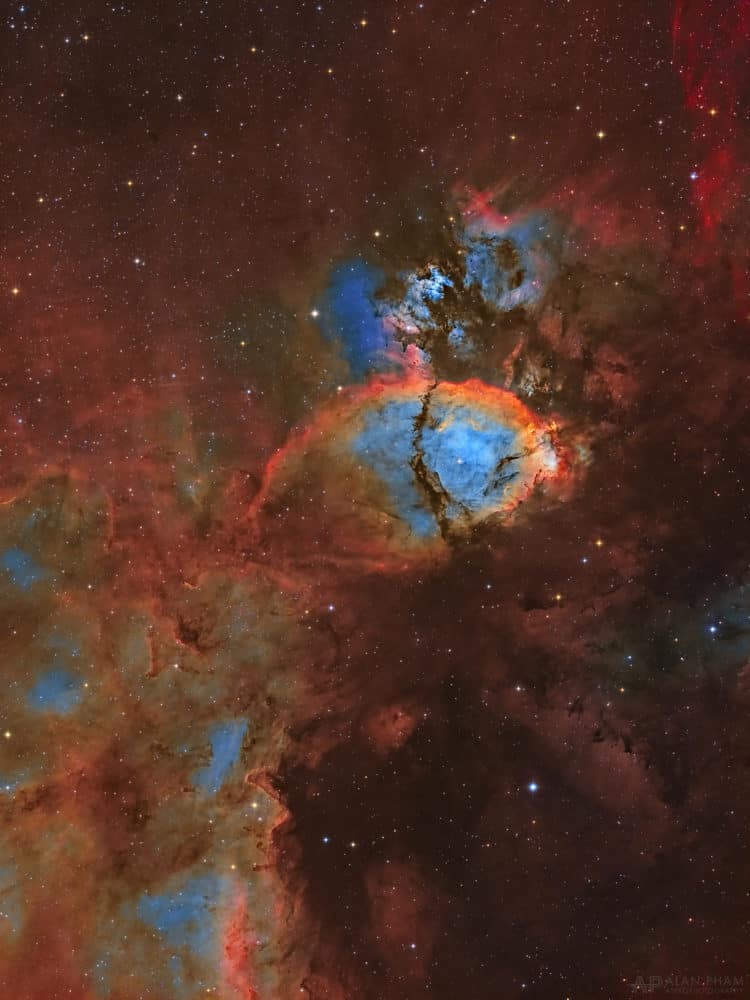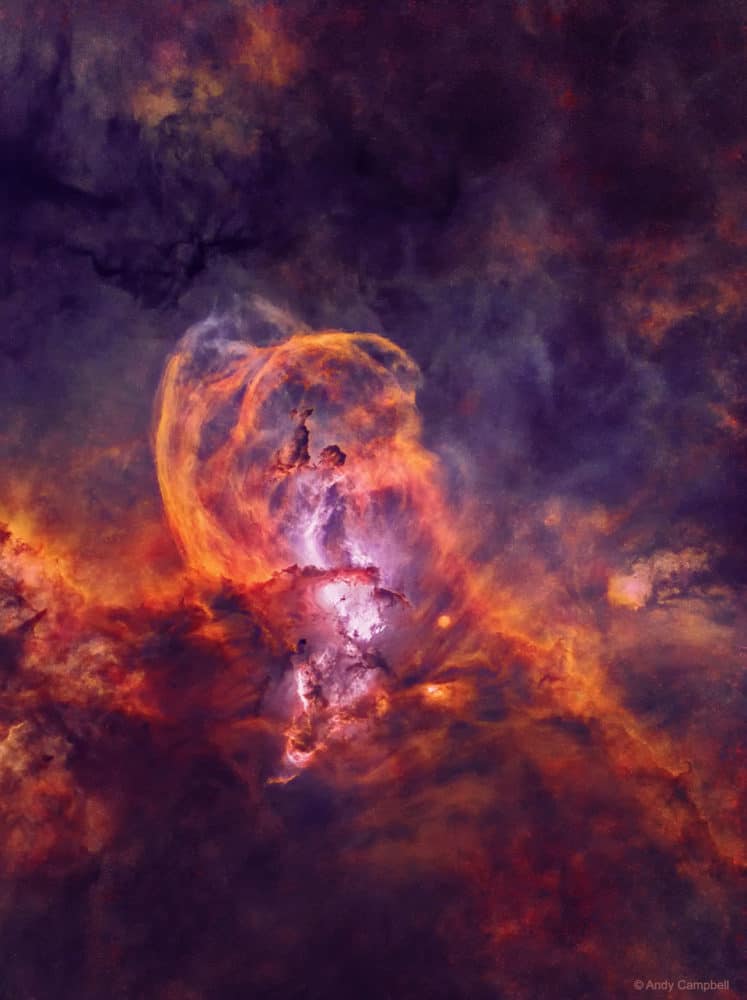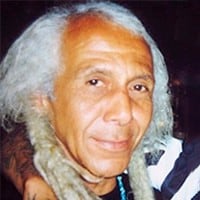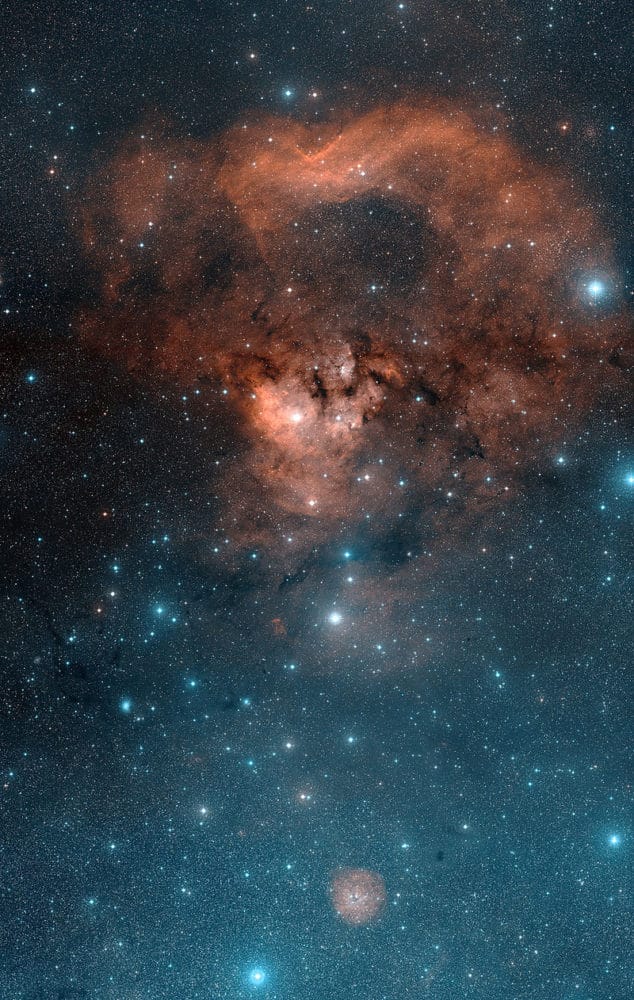Blog
This colorful cosmic portrait really features glowing gas and obscuring dust clouds in The Fishhead Nebula IC 1795, a star forming region in the northern constellation Cassiopeia. The nebula’s colors were created by adopting the Hubble color palette for mapping narrow emission from oxygen, hydrogen, and sulfur atoms to blue, green and red colors, and further blending the data with images of the region recorded through broadband filters. Not far on the sky from the famous Double Star Cluster in Perseus, IC 1795 is itself located next to IC 1805, the Heart Nebula, as part of a complex of star forming regions that lie at the edge of a large molecular cloud. Located just over 6,000 light-years away, the larger star forming complex sprawls along the Perseus spiral arm of our Milky Way Galaxy. At that distance, this picture would span about 70 light-years across IC 1795.
more...Stanley Jordan (born July 31, 1959) is an American jazz guitarist whose technique involves tapping his fingers on the fretboard of the guitar with both hands.
Jordan was born in Chicago, Illinois. When he was six, he started on piano, then at eleven switched to guitar. He later began playing in rock and soul bands. In 1976, he won an award at the Reno Jazz Festival. At Princeton University, he studied music theory and composition with Milton Babbitt and computer music with Paul Lansky. While at Princeton he played with Benny Carter and Dizzy Gillespie.
In 1985, Bruce Lundvall became president of Blue Note Records and Stanley Jordan was the first person he signed. Blue Note released his album Magic Touch, which sat at No.1 on Billboard ‘s jazz chart for 51 weeks, setting a record.
Normally, a guitarist uses two hands to play each note. One hand presses down a guitar string behind a chosen fret to prepare the note, and the other hand either plucks or strums the string to play that note. Jordan’s touch technique is an advanced form of two-handed tapping. The guitarist produces a note using only one finger by quickly tapping (or hammering) his finger down behind the appropriate fret. The impact causes the string to vibrate enough to sound the note, and the volume can be controlled by varying the force of impact. Jordan taps with both hands, and more legato than is normally associated with guitar tapping. His technique allows the guitarist to play melody and chords simultaneously. It is also possible, as he has demonstrated, to play simultaneously on two different guitars, as well as guitar and piano.
https://www.youtube.com/watch?v=-cI_RL_Eg-M
more...Kenneth Earl Burrell (born July 31, 1931) is an American jazz guitarist known for his work on the Blue Note label. His collaborations with Jimmy Smith produced the 1965 Billboard Top Twenty hit album Organ Grinder Swing. He has cited jazz guitarists Charlie Christian and Django Reinhardtas influences, along with blues guitarists T-Bone Walker and Muddy Waters. Burrell is a professor and Director of Jazz Studies at the UCLA Herb Alpert School of Music.
Burrell was born in Detroit, Michigan. Both his parents played instruments, and he began playing guitar at the age of 12 after listening Charlie Christian‘s recordings. During World War II, due to metal shortage, he abandoned the idea of becoming a saxophonist, and bought an acoustic guitarfor $10. He was inspired to play jazz after listening to Oscar Moore, but it was Django Reinhardt who told showed him “that you could get your own individuality on an instrument.” He went on to study composition and theory with Louis Cabara and classical guitar with Joe Fava. While a student at Wayne State University, he made his recording debut as a member of Dizzy Gillespie‘s sextet in 1951, followed by the “Rose of Tangier”/”Ground Round” single recorded under his own name at Fortune Records in Detroit. While in college, Burrell founded the New World Music Society collective with fellow Detroit musicians Pepper Adams, Donald Byrd, Elvin Jones, and Yusef Lateef.
https://www.youtube.com/watch?v=H3PMyiq-xB4
more...Henry Jones Jr. (July 31, 1918 – May 16, 2010), best known as Hank Jones, was an American jazz pianist, bandleader, arranger, and composer. Critics and musicians described Jones as eloquent, lyrical, and impeccable. In 1989, The National Endowment for the Arts honored him with the NEA Jazz Masters Award. He was also honored in 2003 with the American Society of Composers, Authors, and Publishers (ASCAP) Jazz Living Legend Award. In 2008, he was awarded the National Medal of Arts. On April 13, 2009, the University of Hartford presented Jones with an honorary Doctorate of Music for his musical accomplishments.
Jones recorded more than 60 albums under his own name, and countless others as a sideman, including Cannonball Adderley‘s celebrated album Somethin’ Else. On May 19, 1962, he played piano as actress Marilyn Monroe sang her famous “Happy Birthday, Mr. President” song to then U.S. president John F. Kennedy.
Born in Vicksburg, Mississippi, Henry “Hank” Jones moved to Pontiac, Michigan, where his father, Henry Jones Sr. a Baptist deacon and lumber inspector, bought a three-story brick home. One of seven children, Jones was raised in a musical family. His mother Olivia Jones sang; his two older sisters studied piano; and his two younger brothers—Thad, a trumpeter, and Elvin, a drummer—also became prominent jazz musicians. He studied piano at an early age and came under the influence of Earl Hines, Fats Waller, Teddy Wilson, and Art Tatum. By the age of 13 Jones was performing locally in Michigan and Ohio. While playing with territory bands in Grand Rapids and Lansing in 1944 he met Lucky Thompson, who invited Jones to work in New York City at the Onyx Club with Hot Lips Page.
more...https://www.youtube.com/watch?v=Ross1AQbqJw
more...What’s happening in the Statue of Liberty nebula? Bright stars and interesting molecules are forming and being liberated. The complex nebula resides in the star forming region called RCW 57, and besides the iconic monument, to some looks like a flying superhero or a weeping angel. By digitally removing the stars, this image showcases dense knots of dark interstellar dust, fields of glowing hydrogen gas ionized by these stars, and great loops of gas expelled by dying stars. A detailed study of NGC 3576, also known as NGC 3582 and NGC 3584, uncovered at least 33 massive stars in the end stages of formation, and the clear presence of the complex carbon molecules known as polycyclic aromatic hydrocarbons (PAHs). PAHs are thought to be created in the cooling gas of star forming regions, and their development in the Sun’s formation nebula five billion years ago may have been an important step in the development of life on Earth.
more...David William Sanborn (born July 30, 1945) is an American alto saxophonist. Though Sanborn has worked in many genres, his solo recordings typically blend jazz with instrumental pop and R&B. He released his first solo album Taking Off in 1975, but has been playing the saxophone since before he was in high school.
One of the most commercially successful American saxophonists to earn prominence since the 1980s, Sanborn is described by critic Scott Yannow as “the most influential saxophonist on pop, R&B, and crossover players of the past 20 years.” He is often identified with radio-friendly smooth jazz, but he has expressed a disinclination for the genre and his association with it. Sanborn was born in Tampa, Florida, and grew up in Kirkwood, Missouri. He suffered from polio for eight year in his youth. He began playing saxophone on a physician’s advice to strengthen his weakened chest muscles and improve his breathing. Alto saxophonist Hank Crawford, at the time a member of Ray Charles‘s band, was an early and lasting influence on Sanborn.
Sanborn attended college at Northwestern University and studied music. But he transferred to the University of Iowa where he played and studied with saxophonist J.R. Monterose.
more...George “Buddy” Guy (born July 30, 1936) is an American blues guitarist and singer. He is an exponent of Chicago blues and has influenced eminent guitarists including Eric Clapton, Jimi Hendrix, Jimmy Page, Keith Richards, Stevie Ray Vaughan, Jeff Beck, Gary Clark Jr. and John Mayer. In the 1960s, Guy played with Muddy Waters as a house guitarist at Chess Records and began a musical partnership with the harmonica player Junior Wells.
Guy was ranked 23rd in Rolling Stone magazine’s “100 Greatest Guitarists of All Time“. His song “Stone Crazy” was ranked 78th in the Rolling Stone list of the “100 Greatest Guitar Songs of All Time”. Clapton once described him as “the best guitar player alive”. In 1999, Guy wrote the book Damn Right I’ve Got the Blues, with Donald Wilcock. His autobiography, When I Left Home: My Story, was published in 2012.
Guy was born and raised in Lettsworth, Louisiana. His parents were sharecroppers and Guy as a child would pick cotton for $2.50 per 100 pounds. He began learning to play the guitar using a two-string diddley bow he made. Later he was given a Harmony acoustic guitar, which, decades later in Guy’s lengthy career, was donated to the Rock and Roll Hall of Fame.
more...Vernel Anthony Fournier (July 30, 1928 – November 4, 2000) and, from 1975, known as Amir Rushdan, was an American jazz drummer probably best known for his work with Ahmad Jamal from 1956 to 1962.
Fournier was born in New Orleans, Louisiana, into a Creole family. He left college to join a big band led by King Kolax. After Kolax downsized to a quintet, Fournier moved to Chicago in 1948, where he played with such musicians as Buster Bennett, Paul Bascomb and Teddy Wilson. As house drummer at the Bee Hive club on Chicago’s South Side in 1953-55, he accompanied many visiting soloists, including Lester Young, Ben Webster, Sonny Stitt, J.J. Johnson, Earl Washington and Stan Getz.
From 1953 to 1956, Fournier also worked many recording sessions with Al Smith, Red Holloway, Lefty Bates, and others. He joined Ahmad Jamal’s trio in 1957, along with bass player Israel Crosby, and remained with the group until 1962, appearing on a series of recordings for the Chess label. The best known of these, At the Pershing: But Not for Me (1958), became one of the best selling jazz records of all time, remaining on the Billboard jazz charts for over two years.
After leaving the Jamal trio, Fournier joined George Shearing for two years before rejoining Jamal briefly in 1965-66. He then took a long-running gig with a trio at a restaurant owned by Elijah Muhammad.
He converted to Islam in 1975, and took the Muslim name of Amir Rushdan.
He worked with Nancy Wilson, Clifford Jordan, Billy Eckstine and Joe Williams, John Lewis and Barry Harris. Fournier was also a teacher of drumming, working at Barry Harris’s Jazz Cultural Theater, the New School, and the Mannes College of Music.
https://www.youtube.com/watch?v=Xnf3oIkolXI
more...Omara “Bombino” Moctar is a Nigerien singer-songwriter and guitarist. His music is sung in Tamasheq.
more...I met Donald on the West Bank in the 80’s he often hung out at the Viking Bar when the Maroons were performing and a very supportive friend. He was the first Native American I met with dreadlocks. Donald was a West Bank fixture with a revolutionary spirit beaming a wonderful smile and a vigilant determination for social change.
Govan, Donald D. Donald, a lifelong healer, returned to the spirit world July 22, 2019 at the age of 74. He was a prolific poet and indigenous preacher who pioneered an entire culture of radicals and inspired souls far and wide through his poems and persona. A cultivator of good times, Donald’s love for his guitar was only surpassed by his love for beautiful women. He was a father of two but a surrogate Godfather to countless of folk. His legend is too expansive for writings and he will be missed by all who encountered his spirit.
NGC 7822 is a young star forming complex in the constellation of Cepheus. Distance 2900 ly. The complex encompasses the emission region designated Sharpless 171, and the young cluster of stars named Berkeley 59. The complex is believed to be some 800–1000 pc distant, with the younger components aged no more than a few million years. The complex also includes one of the hottest stars discovered within 1 kpc of the Sun, namely BD+66 1673, which is an eclipsing binary system consisting of an O5V that exhibits a surface temperature of nearly 45,000 K and a luminosity about 100,000 times that of the Sun. The star is one of the primary sources illuminating the nebula and shaping the complex’s famed pillars of creation-type formations, the elephant trunks.
more...
Charles Henry Christian (July 29, 1916 – March 2, 1942) was an American swing and jazz guitarist.
Christian was an important early performer on the electric guitar and a key figure in the development of bebop and cool jazz. He gained national exposure as a member of the Benny Goodman Sextet and Orchestra from August 1939 to June 1941. His single-string technique, combined with amplification, helped bring the guitar out of the rhythm section and into the forefront as a solo instrument. John Hammond and George T. Simoncalled Christian the best improvisational talent of the swing era. In the liner notes to the album Solo Flight: The Genius of Charlie Christian (Columbia, 1972), Gene Lees wrote that “Many critics and musicians consider that Christian was one of the founding fathers of bebop, or if not that, at least a precursor to it.”
Christian’s influence reached beyond jazz and swing. In 1990, he was inducted into the Rock and Roll Hall of Fame in the category Early Influence.
In 2006 Oklahoma City renamed a street in its Bricktown entertainment district “Charlie Christian Avenue” (Christian was raised in Oklahoma City and was one of many musicians who jammed along the city’s “Deep Deuce” section on N.E. Second Street).
Christian was born in Bonham, Texas. His family moved to Oklahoma City, Oklahoma, when he was a small child. His parents were musicians. He had two brothers, Edward, born in 1906, and Clarence, born in 1911. All three sons were taught music by their father, Clarence Henry Christian. Clarence Henry was struck blind by fever, and in order to support the family he and the boys worked as buskers, on what the Christians called “busts.” He would have them lead him into the better neighborhoods, where they would perform for cash or goods. When Charles was old enough to go along, he first entertained by dancing.
Christian’s solos are frequently described as “horn-like”, and in that sense he was more influenced by horn players such as Lester Young and Herschel Evan than by early acoustic guitarists like Eddie Lang and the jazz- and bluesman Lonnie Johnson, although they both had contributed to the expansion of the guitar’s role from the rhythm section to a solo instrument. Christian stated he wanted his guitar to sound like a tenor saxophone. The French gypsy jazz guitarist Django Reinhardt had little influence on him, but Christian was obviously familiar with some of his recordings. The guitarist Mary Osborne recalled hearing him play Django’s solo on “St. Louis Blues” note for note, but then following it with his own ideas.
In the late 1930s Christian contracted tuberculosis, and in early 1940 he was hospitalized for a short period in which the Goodman group was on hiatus because of Goodman’s back trouble. Goodman was hospitalized in the summer of 1940 after a brief stay at Santa Catalina Island, California, where the band stayed when they were on the West Coast.
Christian returned home to Oklahoma City in late July 1940 and returned to New York City in September 1940. In early 1941, Christian resumed his hectic lifestyle, heading to Harlem for late-night jam sessions after finishing gigs with the Goodman Sextet and Orchestra in New York City. In June 1941 he was admitted to Seaview, a sanitarium on Staten Island in New York City. He was reported to be making progress, and Down Beat magazine reported in February 1942 that he and Cootie Williams were starting a band.
After a visit to the hospital that same month by the tap dancer and drummer Marion Joseph “Taps” Miller, Christian declined in health. He died March 2, 1942, at the age of 25. He was buried in an unmarked grave in Bonham, Texas. A Texas State Historical Commission Marker and headstone were placed in Gates Hill Cemetery in 1994. The location of the historical marker and headstone was disputed, and in March 2013, Fannin County, Texas, recognized that the marker was in the wrong spot and that Christian is buried under the concrete slab.
more...Donald Matthew Redman (July 29, 1900 – November 30, 1964) was an American jazz musician, arranger, bandleader, and composer. Redman was born in Piedmont, Mineral County, West Virginia. His father was a music teacher, his mother was a singer. Don began playing the trumpet at the age of three, joined his first band at the age of six and by the age of 12 was proficient on all wind instruments ranging from trumpet to oboe as well as piano. He studied at Storer College in Harper’s Ferry and at the Boston Conservatory, then joined Billy Page’s Broadway Syncopaters in New York City. (He was the uncle of saxophonist Dewey Redman, and thus great-uncle of saxophonist Joshua Redman and trumpeter Carlos Redman.) In 1923, Redman joined the Fletcher Henderson orchestra, mostly playing clarinet and saxophones.
He began writing arrangements, and Redman did much to formulate the sound that was to become swing. A trademark of Redman’s arrangements was the band playing harmony under written solos.
more...More Posts
- Daily Roots King Tubby & The Soul Syndicate
- Cosmos ESO 415-19
- John Scofield
- George Winston
- Steve Allen
- Billy Bean
- World Fusion Speed Caravan
- Daily Roots Prince Jammy
- Merry Christmas 2022
- Cosmos Comet/C2022E3(ZTF)
- Noel Redding
- Don Pullen
- Bob James
- Cab Calloway
- World Music from Jerusalem
- Daily Roots Carlene Davis
- Merry Christmas Eve 2022
- Cosmos NGC 1805
- Dave Bartholomew
- Woody Shaw



